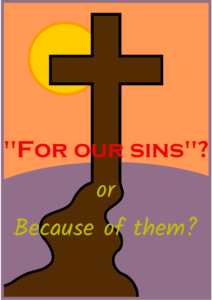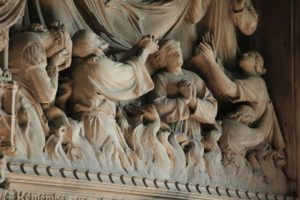
For most Christians around this world, this week marks “Holy Week:” the annual commemoration of the crucifixion, death, burial, and resurrection of Jesus. If you ask most Christians why Jesus died, they will usually answer, “For our sins.”
Where the Idea Come From that Jesus “died for our sins”?
“For our sins” is founded on two beliefs passed down through the centuries by leaders of the monotheistic religions: Judaism, Christianity, and Islam:
- People universally “sin” or disobey the “words”, commandments, and ordinances of God, and
- Sin is an economic model: “If you do the crime, you must do the time” (unless you can get someone else to take the “rap” for you).
 This “Economic Model of Sin” dates back at least to Hammurabi’s, “An eye for an eye” legal code. Punishment should be quick and proportional to the offense. Open up a Bible any page in the book of Leviticus and you will see the list of offences and their corresponding penalty. This idea has been carried through most of Western societies legal traditions: the poor houses of England, stockades, and the guillotine in France. Even today, we see this tradition in the high incarceration rates and the continued use of capital punishment in the United States.
This “Economic Model of Sin” dates back at least to Hammurabi’s, “An eye for an eye” legal code. Punishment should be quick and proportional to the offense. Open up a Bible any page in the book of Leviticus and you will see the list of offences and their corresponding penalty. This idea has been carried through most of Western societies legal traditions: the poor houses of England, stockades, and the guillotine in France. Even today, we see this tradition in the high incarceration rates and the continued use of capital punishment in the United States.
In this view, “sin” is a universal constant of human existence that must be punished to fulfil some universal law of justice. For this reason, hell and eternal damnation were conjured up to supply this punishment in the afterlife (with the caveat that the Roman Catholic Church does include a purgatory for lesser offences where the individual can spend a suitably long period of time being purified of their sins before moving to paradise.
Because this model requires that “debts must be paid,” it became convenient to say that Jesus (who according to Christian doctrine was without sin) died as a surrogate victim to take the “rap” for the rest of us. So because Jesus died for us, it’s all good now. We’re eligible to upgrade our seats on the afterlife to first class to paradise.
Of course there are a number of problems with this model:
- How come almost every sin is punishable as a capital offense?
- How come it only takes a single life of a sinless man (Jesus) to equate to the collective sins of the billions and billions of people who have ever lived and died on Earth?
- Perhaps most importantly, it completely violates our view of social and family relationships. When we are in relationship with one another, we overlook most offences, we offer forgiveness to others, we extend our apologies and accept the apologies of others instead of exacting retribution for wrongs committed. So if Christians sincerely claim that “God loves everyone”, then why doesn’t this god love us in the same way we naturally want to love each other?
What if Jesus Died for Love Instead?
 What if the life (and death) of Jesus wasn’t a zero-sum game to get rid of the need to punish everyone for their sins, but was really about sharing a message of love and acceptance for all people? That would make the story of Christianity more about the life of Jesus, and much less about his passion and death.
What if the life (and death) of Jesus wasn’t a zero-sum game to get rid of the need to punish everyone for their sins, but was really about sharing a message of love and acceptance for all people? That would make the story of Christianity more about the life of Jesus, and much less about his passion and death.
What did Jesus do with his life? Well, he reached out to people through teaching and action. There is a common theme throughout the Gospel texts: God loves and cares for people and that love means that all people have worth and value. The story of the Samaritan woman at the well (Jn 4) is a story about reconciliation and acceptance as are the healing stories.
The systemic structures of oppression in Jesus’ time taught that illness and poverty were punishments for sin.
We do not have to believe in miracles as literal facts to understand how Jesus challenges these narratives. In one story, Jesus heals a paralyzed man by saying to him, “Your sins are forgiven.” The religious authorities were aghast; “How dare this man speak in this way? No one can forgive sin but God alone!” But Jesus points out the fallacy in their Economic Model of Sin by responding, “Which is easier? To say to the man, ‘Your sins are forgiven’? Or to say, ‘Stand up, pick up your mat and walk?'” And then Jesus turns to the man and says, “Stand up, pick up your mat and go home.” (Mk 2, paraphrased).
How can Jesus say, “Your sins are forgiven”? He can say this because he knows that this is the nature of God, and in this story using proof by exception, he demonstrates this truth. God is always loving, always forgiving, always working to break down the walls that protect the rich and privileged. Jesus, doing the work of God, strives to lift up the human spirit by affirming each person’s human dignity and worth.
However, the entrenched structures of political, religious, social, patriarchy, and economic power will not accept this new reality. In Mark’s Gospel, constant mention is made of the “crowd” (in Greek, oxchlos) and the “city” (in Greek, polis). The crowd is the mass of humanity–the homeless; the sick; the single mother; the runaway; the widowed, orphaned, depressed, mentally ill, traumatized, poor, outcast, or broken people who get up every day hoping to find the things they need to survive just to be able to get up again the day after. The cIty is a metaphor for the powerful elite who know that their position and wealth is only safe as long as the crowd keeps to their place on the fringe, never finds a spokesperson to represent their cause, and never asks for more.
The powerful know that they cannot allow love or forgiveness to be proclaimed without restriction or limitation. They didn’t become powerful by leaving things to chance. And so a plan is hatched to terminate this man and hopefully his message. In proclaiming his message, Jesus undoubtedly knew his days were numbered. In this respect, Jesus in no different than Mahatma Ghandi, or Martin Luther King, or Oscar Romero, or hundreds of others who have proclaimed a message of human liberation without violence over the centuries.
Holy Week is not about the forgiveness of our sins. That forgiveness was in force from the moment of our creation. Instead, it is about inviting us to expand the circle of people who we consciously choose to love and forgive. That’s the message that the powerful would like to suppress.

I need to to thank you for this great read!! I certainly loved every bit of it. I have got you book-marked to look at new things you postÖ